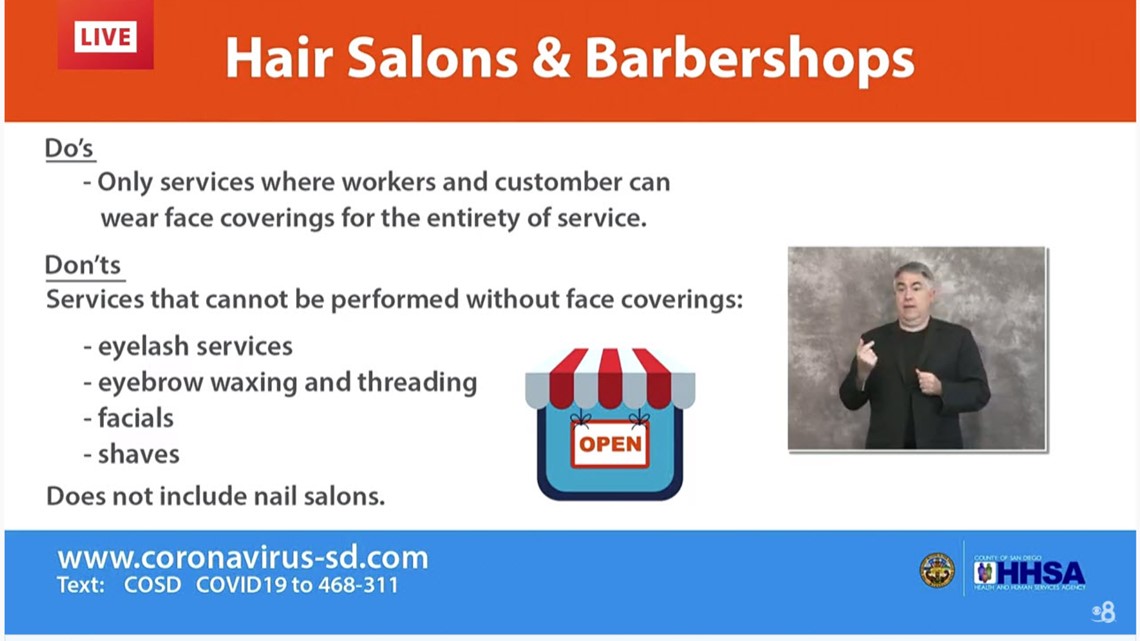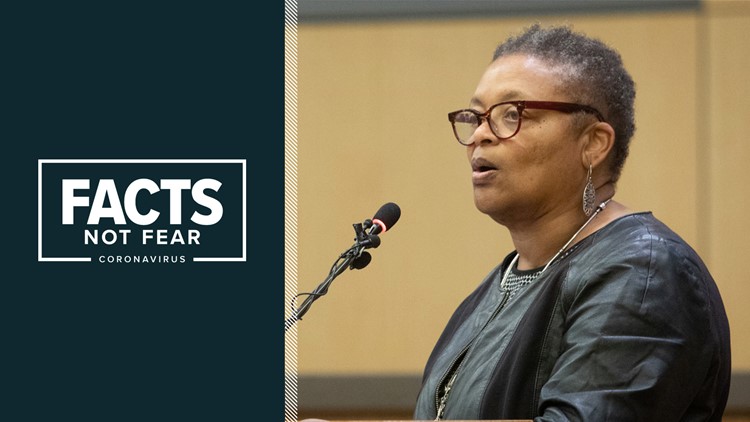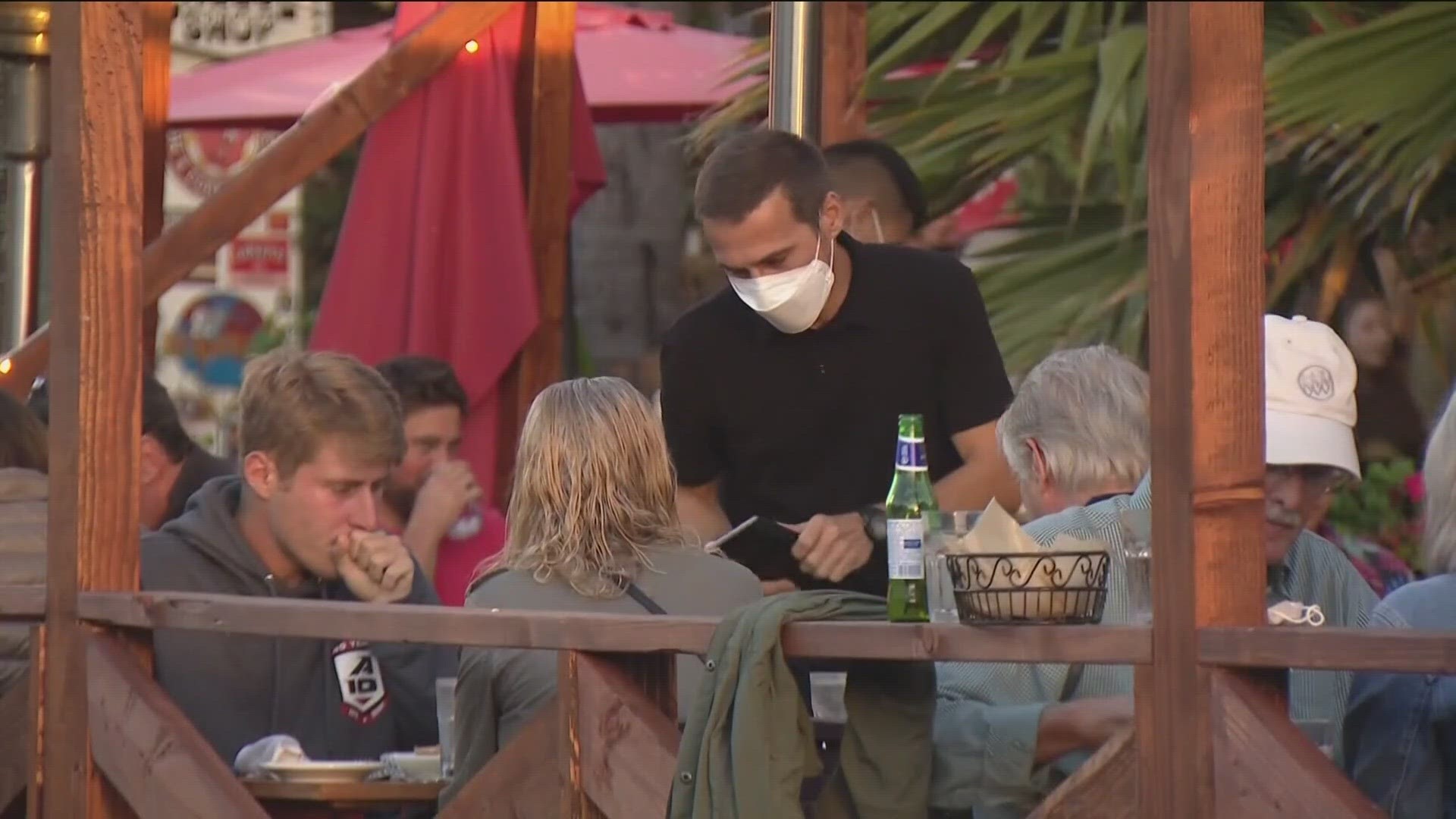SAN DIEGO COUNTY, Calif. — San Diego County officials announced 85 new cases of COVID-19 and no new deaths Tuesday bringing the county totals to 6,882 cases and 249 deaths. It was noted that numbers often lag early in the week.
Officials also discussed the reopening of places of worship along with service businesses like hair salons and barbershops at a briefing Tuesday.
Supervisor Nathan Fletcher said that nail salons are not included in the businesses to reopen per Governor Gavin Newsom's guidance. He also noted that services like eyelash extensions, eyebrow waxing and threading are not allowed under the new guidelines. Fletcher said staff and customers should wear facial coverings throughout an entire service.
Businesses that reopen should do the following according to the county:
- Complete the County's Safe Reopening Plan, post it and share it with employees
- Post guidelines for customers to see
- Temperature/symptom screening for employees at the beginning and end of shifts
- Provide clean face coverings for staff and customers (customers can bring their own
- If employee is sick/has symptoms, they should not go into the salon or barbershop
- Frequent cleaning schedule
Fletcher said San Diego hair service businesses are cleared to reopen as soon as they complete county's Safe Reopening Plan and comply with its components. Businesses can reopen as soon as midnight Wednesday.


-----------------------------------------------------------
RELATED: Governor Newsom says counties can decide whether to reopen hair salons with safety modifications
View all News 8 coverage of coronavirus / COVID-19
News 8 has joined forces with The San Diego Foundation to raise immediate, emergency funds for our most vulnerable neighbors in need. Here is how you can help.
We also have a Frequently Asked Questions page we will continue updating with the latest information and reports.
Click here to watch "Facts Not Fear," a News 8 Special on coronavirus from March 26, 2020.
BACKGROUND
According to the CDC, coronavirus (COVID-19) is a family of viruses that is spreadable from person to person. Coronavirus is believed to have been first detected in a seafood market in Wuhan, China in December 2019. If someone is sick with coronavirus, the symptoms they may show include mild to severe respiratory illness, cough, and difficulty breathing.
Currently, there is no vaccine, however, the CDC suggests the following precautions, as with any other respiratory illness:
Know how it spreads
There is no vaccine
The best way to prevent illness is to avoid being exposed to the virus
It is thought to spread mainly from person-person between people in close contact
And believed to be spread by respiratory droplets produced when an infected person coughs or sneezes
Protect yourself
Wash your hands with soap and water for a minimum of 20 seconds
If soap and water aren't available, use hand sanitizer that contains at least 60% alcohol
Avoid touching your eyes, nose, and mouth
Avoid close contact with people who are sick
Put distance between yourselves and others
Protect others
Stay home when you are sick
Wear a facemask if you are sick
Cover your cough or sneeze with a tissue, then throw the tissue in the trash
If you don't have tissue, cough or sneeze into the inside of your elbow
Immediately wash your hands after coughing and sneezing
Clean and disinfect frequently touched objects and surfaces using a regular household cleaning spray or wipe
You can find information on disinfecting and cleaning on the CDC's How to Protect Yourself page.
The California Department of Public Health has issued guidance on the use of cloth face coverings to protect against the spread of the novel coronavirus COVID-19.
The County of San Diego has made face coverings mandatory for those working with the public including grocery stores, pharmacies, gas stations, convenience stores, and similar businesses.
While officials say these face coverings are not a substitute for practices like social distancing and handwashing, there is evidence to suggest that the use of cloth face coverings by the public during a pandemic could help reduce disease transmission. Officials do not recommend the public use N-95 or surgical masks which are needed by health care workers and first responders.



